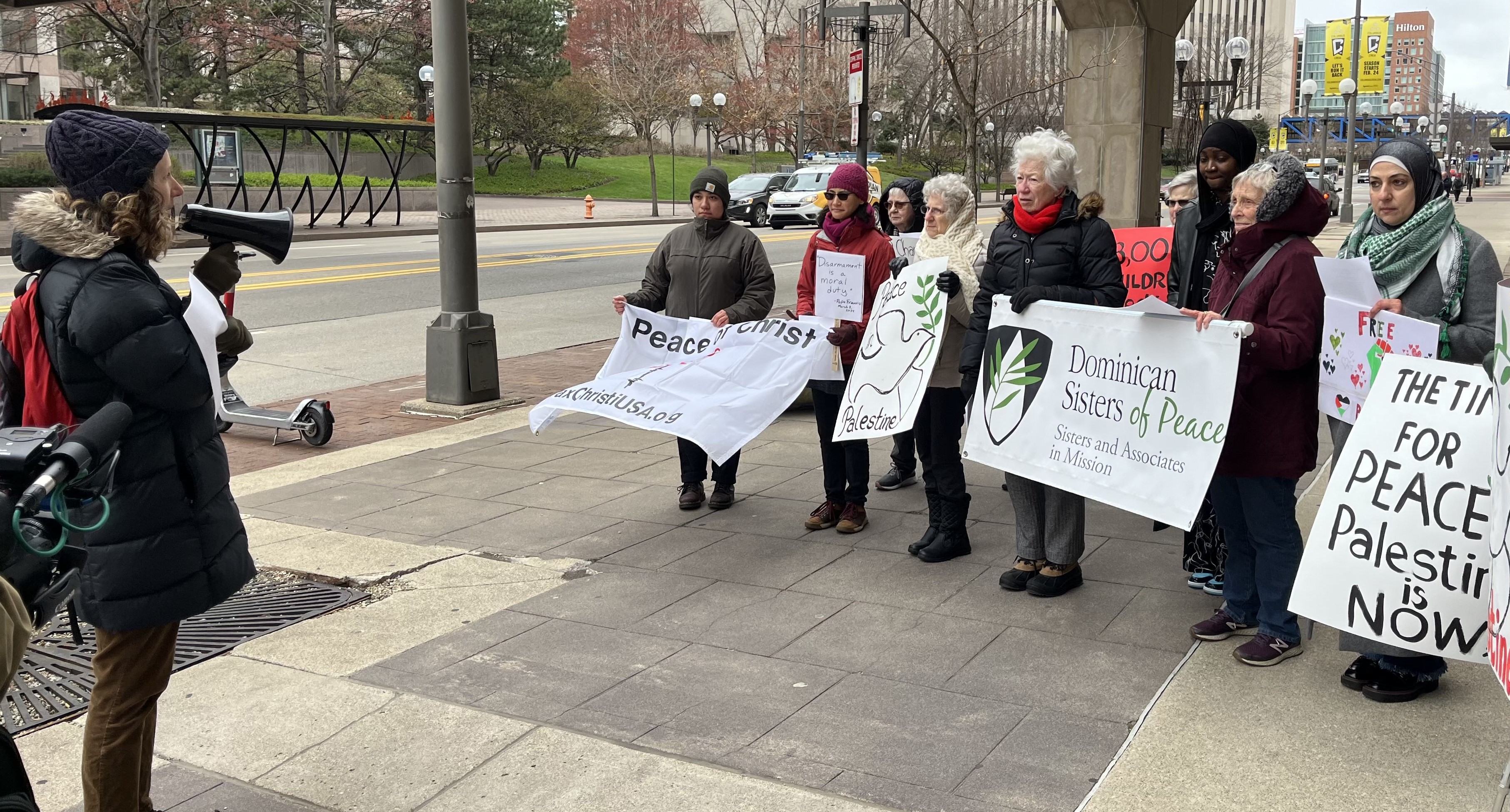
Members of the Dominican Sisters of Peace, along with members of the Coalition of Christians for a Free Palestine and others, march in Columbus, Ohio, to demand a cease-fire in Gaza on March 18. (Courtesy of Dominican Sisters of Peace)
Christians across the U.S. converged on the offices of elected officials on March 18 to demand an immediate and lasting cease-fire in Gaza.
Weeks earlier, when I learned of the call for a day of action, I remembered the Lenten reading in which God commands the chosen people: "Nor shall you stand by idly while your neighbor's life is at stake" (Leviticus 19:16). Inspired by the witness of Muslim and Jewish activists who for months have been protesting U.S. military aid to Israel, I connected with fellow organizers to plan a vigil and prayer service at the office of U.S. Sen. Sherrod Brown, a Democrat, in downtown Columbus. We prepared a statement urging the senator's support to end the siege in Gaza, stop supplying Israel with weapons, reinstate funding for humanitarian relief, and release both Israeli hostages and Palestinian political prisoners.
"Violence will not bring security," we proclaimed; "only a just peace can do that." We would not be complicit in what the United Nations has called genocide enabled by the U.S. government, perpetrated by American-made weapons, and funded by our taxpayer dollars.
I had participated in vigils and protests before, but never organized one. The experience proved that I have much to learn about community organizing and political advocacy. It also deepened my understanding of two fundamental aspects of religious life: our corporate witness and the vow of poverty.
Being a sister means belonging to something larger than myself. Of course, all Christians can say the same — that as members of the church, we belong to the universal Body of Christ. Nevertheless, there is a particular strength to the corporate witness of a religious congregation. It meant that, as a novice organizer, I could turn to structures already in place to mobilize my congregation, the Dominican Sisters of Peace, and our associates in mission. Our congregational justice promoter, a sister with decades of experience, offered advice on logistics and contacted local faith leaders. Our communications team created a graphic, posted on social media and drafted a press release. Sisters made signs proclaiming, "The time for peace in Palestine is now!" and boarded the congregational bus to participate, despite snow and freezing winds.
Advertisement
With 25 people present, the size of the ecumenical action was small, which meant that our congregation was the largest group represented. The sisters showed up and I felt deep gratitude to be counted among their number. Women religious may have less institutional power or social prestige today than we used to, yet our collective presence and corporate witness still make a difference. Our collaborators appreciate the wisdom and experience we bring.
Although I admit to being disappointed with the small turnout (due in part to my inexperience as an organizer), what matters is that we were a recognizable Catholic voice calling for a cease-fire. The widespread silence of some U.S. Catholic leaders about the mass murder of Palestinian civilians, predominantly women and children, has been scandalous. Our president is Catholic, as are 158 members of Congress.
The pope has called often for a cease-fire, as have other church leaders, including Cardinal Pierbattista Pizzaballa of Jerusalem, and Cardinal Robert McElroy of San Diego and Archbishop John Wester of Santa Fe, New Mexico. Yet many Catholic elected officials have approved spending billions of public dollars on weapons for Israel while cutting funds to the United Nations Relief Works Agency, the main U.N. agency providing humanitarian relief in Gaza. Thankfully, Catholic groups like the Franciscan Action Network and Pax Christi USA are engaged in nonviolent direct action, pressuring those with power to halt the flow of arms, prevent further killing, and hold Israel accountable for its actions.
After our prayer vigil in Columbus, three representatives from our group — a Muslim woman with family in Palestine, a politically engaged Catholic college student and a Presbyterian minister who had just returned from a solidarity trip to the West Bank — were allowed to talk with a member of the senator's staff. The meeting left us disappointed; though the senator does not condone the killing of civilians, he would not take action to stop it. How, I wondered, does a person of conscience refuse to wield the power they have "to do good … rather than to do evil, to save life rather than to destroy it?" (Mark 3:4).
The killings in Palestine continue because some Americans are making a profit. Who benefits from sending bombs abroad? The U.S. defense industry and weapons manufacturers, which also profit from fueling gun violence at home. These merchants of death hold outsized influence over political power in this country, and our young people know it.
I teach writing to first-year college students. In my classes, we reflect on our responsibilities as citizens of a democracy. This year, when I asked students how they could make a difference in their communities, they answered: make a lot of money and post on social media. The fact that they didn't mention voting or organizing disheartened but did not surprise me. They see that in our country these days, it requires capital to influence political agendas.
Money, power and political rule — these are precisely the worldly goods that sisters renounce when we take a vow of poverty. I realized the cost of that poverty after our action at the senator's office. By choosing to follow the poor and nonviolent Jesus, we renounce access to state power, which money can buy. That choice situates us in solidarity with all people who oppose the rule of empire by taking to the streets, marching, sitting in, blockading and petitioning. In a spirit of poverty, we entrust our small actions to God, without whom we can do nothing and with whom all things are possible. The gift of our poverty is the freedom it gives us to seek the truth.
Seeking truth is part of the Dominican preaching charism. Dominican sisters are missioned to embody the truth by proclaiming our belief in a God of abundant life. Whatever is death-dealing is not of God. Clinging to this belief, that all life is sacred and has value, helps us to see through the pretense that Israel's destruction of Gaza is justified by the right to self-defense. Contrary to what many American institutions are saying, there are not two sides to a siege that targets refugees, medics, journalists and aid workers. A lasting ceasefire would save the lives of both Palestinians and Israelis.
Bombardment, starvation, the destruction of homes and hospitals — these acts are horrific sins for which all Americans will be called to account. As followers of Jesus, "the Way, the Truth, and the Life," Christians must educate their faith communities about the urgent need to halt arms sales to Israel and relieve the impending famine in Gaza. Through collective witnessing and faith-filled solidarity, we build the people power necessary to protect the lives of all our beloved neighbors in Israel and Palestine. Our love of truth impels us not to stand idly by.






